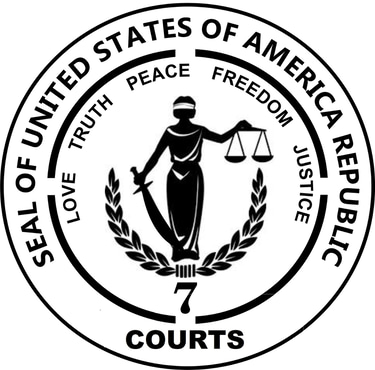AN OFFICIAL SITE OF THE UNITED STATES OF AMERICA REPUBLIC NATIONAL GOVERNMENT
JUSTICE FOR ALL
Ensuring fair and impartial resolution of disputes while upholding individual rights and government accountability.
Types of Court Justice for a National Citizen
The judicial system offers national citizens different forms of court justice depending on the nature of the legal issue. The primary types of cases a citizen might face in court include:
1.1 Criminal Justice
Criminal Prosecution: If a national citizen is accused of committing a crime, they face prosecution in a criminal court. The justice system ensures that the individual is presumed innocent until proven guilty beyond a reasonable doubt.
Punishments and Penalties: Criminal courts impose penalties such as imprisonment, fines, probation, or community service if a citizen is found guilty of a criminal offense. The aim is to ensure that punishments fit the crime, rehabilitate offenders, and deter further criminal behavior.
Due Process Protections: The criminal justice system ensures that the accused has the right to remain silent, the right to a defense, the right to a speedy trial, and the right to be protected from cruel or unusual punishment.
1.2 Civil Justice
Dispute Resolution: National citizens may seek court justice in civil matters, such as contract disputes, property issues, personal injury claims, and family law cases (e.g., divorce, child custody, inheritance). Civil courts determine liability and award appropriate remedies, including damages or specific performance (e.g., enforcing a contract).
Civil Rights Protection: Civil courts can also address cases of discrimination, harassment, or violations of an individual’s civil rights, ensuring equal treatment under the law.
1.3 Administrative Justice
Government Disputes: Nationals may bring cases against government agencies in administrative courts if they believe their rights have been violated or if they are challenging a government action, policy, or decision (e.g., social welfare decisions, immigration rulings, tax disputes).
Regulatory and Enforcement Actions: These cases often deal with the enforcement of regulations set by government agencies and can address issues such as zoning laws, environmental regulations, and public safety laws.
1.4 Constitutional Justice
Constitutional Protection: National citizens have the right to challenge laws or government actions they believe are unconstitutional. Constitutional courts or supreme courts interpret the constitution and can rule on cases that involve fundamental rights, the separation of powers, or the limits of government authority.
Protection of Fundamental Rights: Citizens can approach the court to protect their civil liberties (e.g., freedom of speech, privacy, freedom of assembly) if they believe that their rights have been infringed by laws or government actions.
UNITED STATES OF AMERICA REPUBLIC
ADDRESS: USAR COURTS
© 2025. All rights reserved.
NATIONAL COURTS
1499 MLK DR, STE 64102
PROVINCE INDIANA, 46402
Email:: court@usarcourtsgov.us
